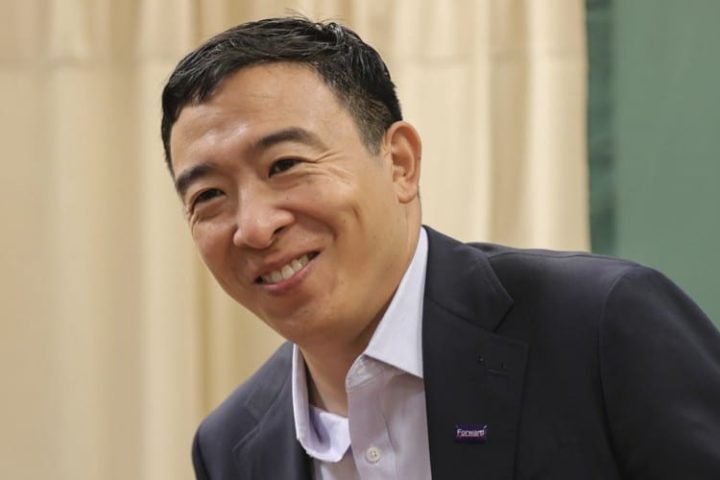
Andrew Yang, the erstwhile presidential and NYC mayoral candidate, made big news this week. First, he announced Monday that he was leaving the Democratic Party.
Second, he stated that he was starting his own: the Forward Party.
He even has what sounds like his slogan, telling Tucker Carlson Today on Thursday that his party’s philosophy can be epitomized thus: “not left or right, but forward.”
This terminology is interesting, especially since Yang is billed as a “moderate” and a breath of fresh air. Note that Forward! was the name of the Italian Socialist Party’s newspaper — of which fascist leader Benito Mussolini was once chief editor. It also quite prominently became one of Barack Obama’s slogans.
None of this is to imply Yang is a fascist or doctrinaire socialist or that he’s not as sincere as his dewy-eyed supporters fancy (or that he is). It is to say that most of his ideas are about as new as fascism or socialism and that, as commentator Andrea Widburg put it Thursday, there’s “nothing moderate about Andrew Yang.”
There’s also little that’s truly substantive. Consider Yang’s “not left or right, but forward” line, which is rhetorically effective as appeals to progress will be. Now, it is true that there’s a puerility to the left-right paradigm (read here), with what the terms represent generally being quite relative. Yet since any appeal such as Yang’s has a similar problem, we should always ask: Forward to what?
Philosopher G.K. Chesterton noted in 1905, “Progress is a comparative of which we have not settled the superlative.” In other words, progress implies movement toward a goal; therefore, insofar as you’re unsure of the goal, you’ll be unsure of the progress.
This is relevant because since leftists (and too many moderns in general) are relativists, lacking a concrete, unchanging vision of how things ought to be, their goalposts are ever changing.
It’s a bit like saying that you have a map and you’re going to travel and proceed forward. You can certainly put the car in drive, as opposed to reverse, and go “forward” (as determined by where the vehicle’s front end happens to be pointing). But if you lack a firm idea about what your destination on the map is, how can you know if you’re progressing toward it? What’s more, even if you do know the destination, how can you know if it’s someplace you want to progress toward if you don’t really understand what’s there?
You can move forward toward freedom or hellfire, morality or mayhem, success or servitude. Without specificity, a “forward” appeal is an insult to intelligence — and fraught with risk.
As for what Yang considers going “forward,” “The top item on his new party’s home page is ‘Ranked-Choice Voting and Open Primaries,’” informs the aforementioned Widburg. “Both are horrific ideas.” She continues:
As a practical matter, ranked-choice voting is a failure because it’s so complicated. You don’t vote for your candidate. Instead, you look at all the candidates and assign numbers to them.
So, if the candidates are Angela, Bob, Carol, and David and you really like Carol, you don’t just vote for Carol. Instead, you must rank them in order of preference: Carol, Bob, David, Angela.
If someone doesn’t get a majority, the person with the fewest votes gets booted from the vote count and all the people who had that person as their first choice, have their votes transferred to their second choice. (Are you still with me?) This keeps going until someone finally gets a winning vote — and voters might discover that their least favorite candidate got their vote. So my votes, rather than helping Carol, may have been used to elect Angela.
Ultimately, under ranked-choice voting, there’s never a clear majority winner. There’s just someone who managed to slog through all the constant reallocations of various rankings from hundreds of thousands of voters. In the 2010 Australian house election, ranked-choice voting gave the victory to the Labor Party even though the Liberal-National coalition got the majority of first-place votes. Crazy, right?
Note that ranked-choice voting’s added complexity should make vote fraud even more likely. This is the last thing we need on a stolen election’s heels.
As for open primaries, Widburg points out that such a system is a reason why Republicans are completely shut out in California, where in 2016 two Democrats faced each other in a Senate race general election. Perhaps it doesn’t matter in the final analysis once a state moves as far left as California has, as left-wingers will prevail regardless. But it seems that Yang’s remedy for what he considers the two-party-system problem is to give us what’s more visibly a one-party system.
Yang also mentioned in his Tucker Carlson interview (video below), while criticizing the two-party system, that the Constitution says nothing about parties and that the Founding Fathers feared factionalism. Yet if he’s going to cite the Constitution, he should note that it also says nothing about allowing for the kind of federally orchestrated technocracy he espouses.
For one thing, Yang is a strong proponent of a universal basic income, an idea that has gained traction in recent years. Finland experimented with it briefly, but then abandoned the endeavor. The idea is nothing new, either. In fact, “Universal income as a policy dates from at least Thomas Paine’s 1795 Agrarian Justice,” according to Zero Hedge.
But Yang truly tipped his hand on the campaign trail in 2019 when he proposed taxing beef so as to raise its price and discourage its use (video below).
As a respondent under the above tweet put it, “So only the elite get steak?”
Bingo.
If you think the world’s Obamas will relinquish their $100-a-pound Kobe beef to show solidarity with us hoi polloi, well, I have old mistakes packaged as new ideas in a Yang wrapper to sell you.
Yang does outline some real problems, such as the increasing loss of jobs to automation and artificial intelligence. He’s not stupid, either. But he’s also lacking in something an ancient man (Confucius) from the land of his ancestors defined thus: “Wisdom is, when you know something, knowing that you know it; and when you do not know something, knowing that you do not know it.”
Andrew Yang appears just another starry-eyed utopian who doesn’t know what he doesn’t know. He perhaps ought to ponder that before setting out to do good, you first must know what the good is. Relativists need not apply.
The full Tucker Carlson Today interview with Yang is below.



